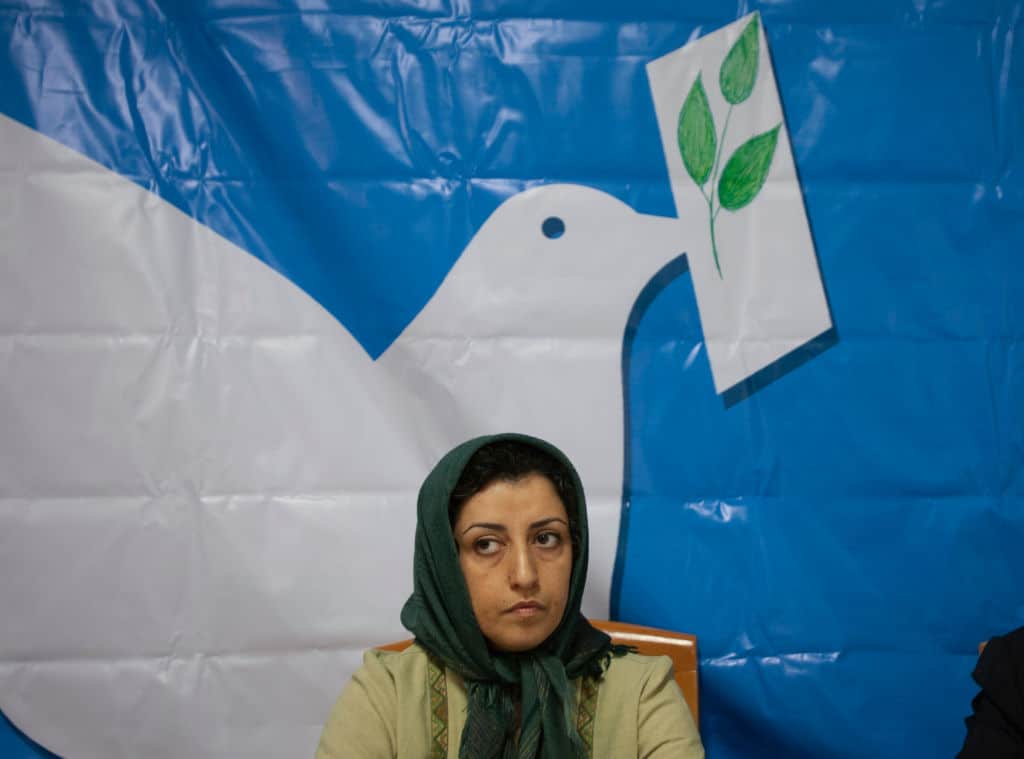TOPLINE
The woman who won the Nobel Peace Prize for her gender advocacy in Iran has started a hunger strike in prison, multiple outlets reported Monday, after she and other female inmates were blocked from receiving medical care over their refusal to wear a headscarf.
KEY FACTS
Narges Mohammadi was refused a transfer from Evin prison last week after a doctor diagnosed her with two severe vein blockages and high lung pressure, and ordered she undergo an off-site coronary angiogram and lung scan, the BBC reported..
The prison’s warden refused to send her out of the prison without a headscarf, her family told the BBC, and Mohammadi said she would not wear the “forced hijab” even for medical treatment.
Mohammadi began a hunger strike on Monday to protest the restriction and that of jailed attorney and activist Nasrin Sotoudeh, among other women who refuse to wear a headscarf under Iranian law.
PROMOTED
Loading...
Inmates protested in the prison yard for two days and nights to send Mohammadi to the heart hospital, her family told the BBC, but were told the transfer would not happen unless Mohammadi agreed to wear the hijab.
Mohammadi’s daughter last week read a message her mother had smuggled out of jail, the first official reaction to her winning of the Nobel Peace Prize on October 6, in which she called the laws forcing women to wear a hijab “a means of control and repression” by the “authoritarian religious regime” of Iran, French newspaper Le Monde reported.
KEY BACKGROUND
The Nobel Foundation last month awarded the Nobel Peace Prize to Mohammadi, who is serving several prison sentences totalling 31 years in jail, and she also faces 154 lashes of a whip. Mohammadi has been an advocate for equality and women’s rights since her days as a student in the 1990s and has been involved with the Defenders of Human Rights Center in Tehran, founded by a fellow Nobel Peace Prize laureate, since 2003. She has been arrested more than a dozen times in the last decade for her women’s advocacy work and has continued her work as an inmate, which has been met with harsh conditions like a ban on phone calls and visitors, the foundation said. Mohammadi has spoken against the forced wearing of headscarves in Iran, use of the death penalty, the use of torture and sexual violence against political prisoners and the government’s policies of discrimination targeting women. Mohammadi’s advocacy has kept her from seeing her husband for 15 years and her children (twin daughters who are 16) for seven years, according to Reuters. They live in exile in France.
Forbes Daily: Get our best stories, exclusive reporting and essential analysis of the day’s news in your inbox every weekday.Sign Up
By signing up, you accept and agree to our Terms of Service (including the class action waiver and arbitration provisions), and you acknowledge our Privacy Statement.
CRUCIAL QUOTE
“Woman, Life, Freedom.” Mohammadi said news of her winning the Nobel was met with cheers from her cell mates of her movement’s three-word slogan.
TANGENT
Cries against Iran’s strict Islamic dress code that, sets out several rules to punish women who do not wear the hijab properly, have intensified in the last month following the apparent beating of a 16-year-old girl. Armita Geravand fell into a coma after she was reportedly beaten by government “morality” agents in Iran on October 1 for not wearing a headscarf on the subway. Iranian state media weeks ago reported she was pronounced brain dead a month after the incident. CCTV footage shows Geravand entering a train with her hair uncovered and being carried off moments later while unconscious, but no footage from inside the train has been released. Hengaw, an activist group, said Gerevand instead suffered a “severe physical assault” by government agents in Tehran but authorities have insisted she fainted and said her death was due to pre-existing medical conditions. Sotoudeh, the jailed lawyer who was denied medical treatment alongside Mohammadi, was arrested for attending Geravand’s funeral while not wearing a hijab, the Associated Press reported.
SURPRISING FACT
Wearing a hijab has been required by women in public spaces in Iran since shortly after the 1979 Islamic revolution. A new law was passed by parliament in September dubbed the “hijab bill,” which punishes women who do not wear the hijab properly and men who wear “revealing clothing.” Women in Iran can face up to 10 years in prison for “inappropriate dress.”
Loading...
